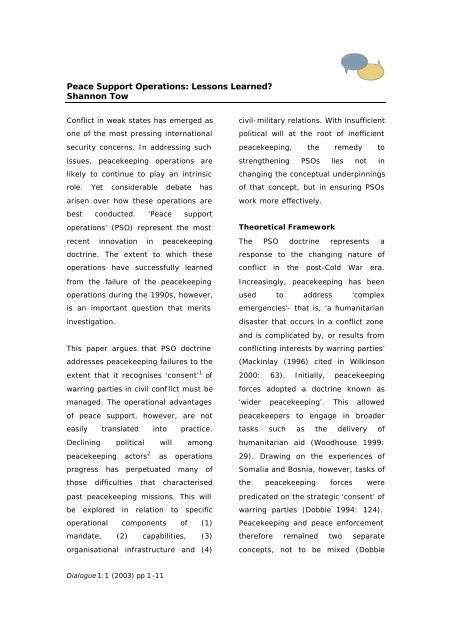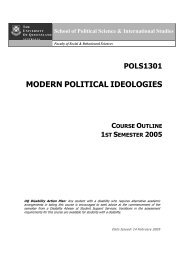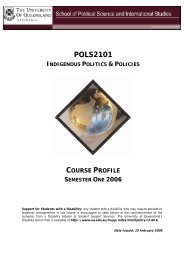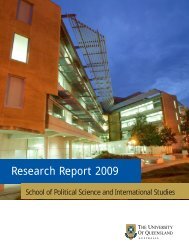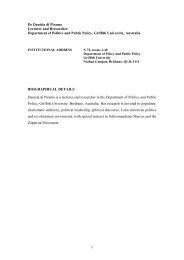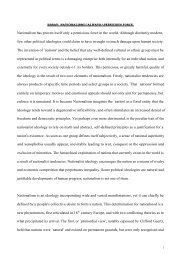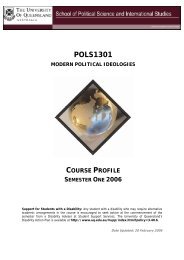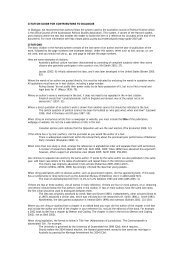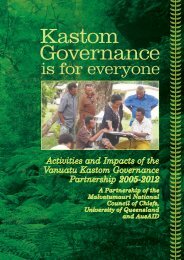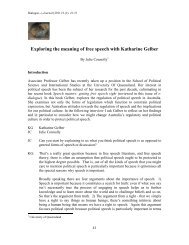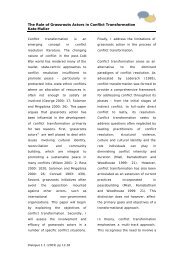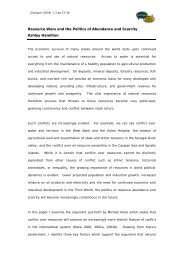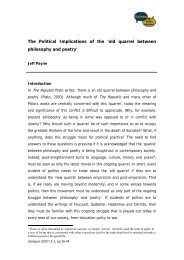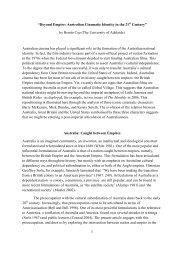Peace Support Operations: Lessons Learned? - School of Political ...
Peace Support Operations: Lessons Learned? - School of Political ...
Peace Support Operations: Lessons Learned? - School of Political ...
You also want an ePaper? Increase the reach of your titles
YUMPU automatically turns print PDFs into web optimized ePapers that Google loves.
<strong>Peace</strong> <strong>Support</strong> <strong>Operations</strong>: <strong>Lessons</strong> <strong>Learned</strong>?<br />
Shannon Tow<br />
Conflict in weak states has emerged as<br />
one <strong>of</strong> the most pressing international<br />
security concerns. In addressing such<br />
issues, peacekeeping operations are<br />
likely to continue to play an intrinsic<br />
role. Yet considerable debate has<br />
arisen over how these operations are<br />
best conducted. ‘<strong>Peace</strong> support<br />
operations’ (PSO) represent the most<br />
recent innovation in peacekeeping<br />
doctrine. The extent to which these<br />
operations have successfully learned<br />
from the failure <strong>of</strong> the peacekeeping<br />
operations during the 1990s, however,<br />
is an important question that merits<br />
investigation.<br />
This paper argues that PSO doctrine<br />
addresses peacekeeping failures to the<br />
extent that it recognises ‘consent’ 1 <strong>of</strong><br />
warring parties in civil conflict must be<br />
managed. The operational advantages<br />
<strong>of</strong> peace support, however, are not<br />
easily translated into practice.<br />
Declining political will among<br />
peacekeeping actors 2 as operations<br />
progress has perpetuated many <strong>of</strong><br />
those difficulties that characterised<br />
past peacekeeping missions. This will<br />
be explored in relation to specific<br />
operational components <strong>of</strong> (1)<br />
mandate, (2) capabilities, (3)<br />
organisational infrastructure and (4)<br />
civil-military relations. With insufficient<br />
political will at the root <strong>of</strong> inefficient<br />
peacekeeping, the remedy to<br />
strengthening PSOs lies not in<br />
changing the conceptual underpinnings<br />
<strong>of</strong> that concept, but in ensuring PSOs<br />
work more effectively.<br />
Theoretical Framework<br />
The PSO doctrine represents a<br />
response to the changing nature <strong>of</strong><br />
conflict in the post-Cold War era.<br />
Increasingly, peacekeeping has been<br />
used to address ‘complex<br />
emergencies’- that is, ‘a humanitarian<br />
disaster that occurs in a conflict zone<br />
and is complicated by, or results from<br />
conflicting interests by warring parties’<br />
(Mackinlay (1996) cited in Wilkinson<br />
2000: 63). Initially, peacekeeping<br />
forces adopted a doctrine known as<br />
‘wider peacekeeping’. This allowed<br />
peacekeepers to engage in broader<br />
tasks such as the delivery <strong>of</strong><br />
humanitarian aid (Woodhouse 1999:<br />
29). Drawing on the experiences <strong>of</strong><br />
Somalia and Bosnia, however, tasks <strong>of</strong><br />
the peacekeeping forces were<br />
predicated on the strategic ‘consent’ <strong>of</strong><br />
warring parties (Dobbie 1994: 124).<br />
<strong>Peace</strong>keeping and peace enforcement<br />
therefore remained two separate<br />
concepts, not to be mixed (Dobbie<br />
Dialogue 1:1 (2003) pp 1-11
PEACE SUPPORT OPERATIONS: LESSONS LEARNED?<br />
Shannon Tow<br />
1994: 121). Yet ‘wider peacekeeping’<br />
fundamentally misinterprets the<br />
lessons <strong>of</strong> the 1990s. The difficulties<br />
inherent in these earlier missions lay<br />
not in breaching the consent line but<br />
rather that in many <strong>of</strong> these conflicts<br />
tactical and strategic consent dividing<br />
lines were meaningless. The ousting <strong>of</strong><br />
Siad Barre from Somalia, for example,<br />
led to the collapse <strong>of</strong> any central<br />
authority controlling the warring<br />
factions (Berdal 1993: 10).<br />
In addressing this issue <strong>of</strong> consent,<br />
the PSO doctrine goes some way<br />
towards applying lessons emanating<br />
from past missions. The PSO doctrine<br />
still regards consent as an important<br />
component <strong>of</strong> any peacekeeping<br />
mission. Rather than posited as a<br />
precondition to intervention, however,<br />
consent is viewed as variable and as<br />
an element that must be managed<br />
(Wilkinson 1996: 33). On one level,<br />
this may be done through limited<br />
enforcement mechanisms. While<br />
maintaining impartiality, the PSO<br />
doctrine envisions a 'spectrum <strong>of</strong><br />
conflict’ to deter belligerents<br />
(Wilkinson 1996: 31). This entails both<br />
peacekeeping where consent is less<br />
problematic and peace enforcement<br />
where consent is more problematic<br />
(Wilkinson 1996: 31). Simultaneously,<br />
however, the doctrine provides that<br />
peacekeeping forces maintain consent<br />
and reduce military escalation by<br />
engaging in ‘capacity building’. This<br />
entails such measures as conducting<br />
public affairs campaigns, rebuilding<br />
infrastructure and engaging in<br />
mediation (Woodhouse 1999: 33).<br />
These measures are regarded as<br />
necessary to creating a peaceful endstate<br />
(Woodhouse 1999: 33).<br />
The PSO doctrine therefore addresses<br />
important criticisms <strong>of</strong> earlier<br />
peacekeeping missions rendered by<br />
the authoritative Brahimi Report,<br />
submitted to the UN in August 2000.<br />
Yet issues <strong>of</strong> declining political will<br />
among peacekeeping actors, implicit in<br />
the report, are likely to undercut many<br />
<strong>of</strong> the PSO doctrine’s operational<br />
advantages. What follows is an<br />
expanded assessment <strong>of</strong> how well<br />
PSOs have operationalised this link<br />
between political will and force<br />
effectiveness.<br />
Operational Components<br />
Mandates<br />
Among the Brahimi Report’s concerns,<br />
was the failure <strong>of</strong> earlier peacekeeping<br />
missions to devise clear and specific<br />
mandates that reflect operational<br />
realities (United Nations General<br />
Assembly). This was particularly<br />
evidenced by the United Nations<br />
Dialogue 1:1 (2003) 2
PEACE SUPPORT OPERATIONS: LESSONS LEARNED?<br />
Shannon Tow<br />
Protection Force (UNPROFOR) 3 . The<br />
UN authorised individual member<br />
states to “take all measures<br />
necessary” to restore peace and<br />
security but did not explicitly direct<br />
parties as to how to achieve these<br />
objectives (Hillen 2000: 169). The PSO<br />
doctrine’s acknowledgement that<br />
consent is variable partially overcomes<br />
this difficulty. By allowing for the use<br />
<strong>of</strong> measured force, PSOs facilitate<br />
greater responsiveness to actual<br />
ground conditions- a mandate that<br />
neither overstretches the force ‘nor<br />
inhibits the commanders from getting<br />
on with the job’ (Wilkinson 1996: 33).<br />
This capacity is further enhanced by<br />
the tendency to outsource PSOs to<br />
more capable and homogenous<br />
regional organizations that are <strong>of</strong>ten<br />
able to form more specific mandates<br />
with less political compromise<br />
(Williams 1998: 30). Successful efforts<br />
by the NATO-led Kosovo Force (KFOR)<br />
to counter Albanian attacks against the<br />
Serb quarter <strong>of</strong> Mitrovica are<br />
indicative.<br />
The deterioration <strong>of</strong> political will as the<br />
mission progresses, however, could<br />
undercut such operational advantages.<br />
This is especially manifest in two ways.<br />
Firstly, member states <strong>of</strong><br />
peacekeeping operations want to<br />
ensure sufficient maneouverability and<br />
control over their forces. This can<br />
inhibit them from including more<br />
specific strategic guidance in the<br />
mandate. As Alex Bellamy observes,<br />
insufficient direction as to how force is<br />
to be employed could lead to ‘[the]<br />
danger that Rules <strong>of</strong> Engagement and<br />
Chapter VII authorisation become so<br />
predominant that force becomes an<br />
end in itself, rather than being a<br />
means to a wider political end’<br />
(Bellamy 2002: 26).<br />
Alternatively, a PSO mandate might be<br />
too limited in scope to effectively<br />
sustain peace in the longer term. This<br />
is most recently exemplified by the<br />
ISAF force in Afghanistan. Sufficient<br />
consensus initially existed that this<br />
peacekeeping mission might later be<br />
expanded to support Afghanistan’s<br />
interim government. In spite <strong>of</strong> the<br />
difficulties <strong>of</strong> demobilisation and direct<br />
attacks on aid workers, however,<br />
member states have refused to<br />
increase troop levels and expand the<br />
mission outside Kabul (Deen 2002: 5;<br />
Holt 2002: 3). This, in turn, raises<br />
questions as to what extent ISAF can<br />
provide for a stable end-state. While<br />
PSOs may resolve many <strong>of</strong> those<br />
problems previously associated with<br />
peacekeeping mandates by recognising<br />
consent as variable, absence <strong>of</strong><br />
political dedication to peace operations<br />
Dialogue 1:1 (2003) 3
PEACE SUPPORT OPERATIONS: LESSONS LEARNED?<br />
Shannon Tow<br />
in the longer term might preclude<br />
these lessons being translated into<br />
practice.<br />
Capabilities<br />
Admittedly, attempts to limit the<br />
mandate reflect past peacekeeping<br />
operations and the difficulties that<br />
resulted from the gap between<br />
mandate and means. In Rwanda, for<br />
instance, Force Commander Lieutenant<br />
General Romeo Dallaire requested<br />
4500 troops to meet warnings <strong>of</strong><br />
escalating violence between Hutus and<br />
Tustsis, yet was granted only 2500.<br />
This number proved insufficient to<br />
protect civilian populations in the<br />
ensuing genocide (<strong>Lessons</strong> <strong>Learned</strong><br />
Unit 1996). By addressing the issue <strong>of</strong><br />
variable consent, PSOs necessarily<br />
provide the framework and<br />
justification for the more ‘robust force’<br />
that the Brahimi Report advocates<br />
(United Nations General Assembly<br />
2000).<br />
INTERFET 4 represents a successful<br />
case in point. Continuing attacks by<br />
pro-Indonesian militias against the<br />
East Timorese population following the<br />
August 1999 referendum, impelled the<br />
UN to authorise Australia to forge a<br />
coalition-<strong>of</strong>-the-willing to intervene.<br />
Australia’s ties in the region enabled it<br />
to form a coalition force <strong>of</strong> ASEAN<br />
states (Cotton 2001: 131). Australia<br />
also provided advanced air and sea<br />
units for force protection and heavy<br />
armour and artillery enabling rapid<br />
deployment. These capabilities proved<br />
instrumental in countering TNI militias<br />
in East Timor (Breen 2000: 135).<br />
Although boasting higher overall<br />
capability levels than past<br />
peacekeeping missions, recent PSOs<br />
have simultaneously highlighted how<br />
this operational advantage might be<br />
threatened by deteriorating political<br />
will <strong>of</strong> peacekeeping forces over time.<br />
This is not only the case in fulfilling<br />
capability requirements promised but<br />
in sustaining these commitments for<br />
the duration <strong>of</strong> the mission. As ‘public<br />
interest’ in a particular conflict wanes,<br />
so too do member states’ willingness<br />
to provide capabilities, particularly as<br />
other national interests come to the<br />
fore (Mackinlay and Kent 1997: 34).<br />
This has devastating ramifications for<br />
PSOs. The key benefit <strong>of</strong> the PSO<br />
model is the ‘spectrum <strong>of</strong> conflict’ it<br />
uses to sustain peace and the implicit<br />
‘robust force’ necessary to realise this<br />
objective. Former KFOR Commander<br />
Klaus Reinhardt reflected the most<br />
difficult part <strong>of</strong> his mission was<br />
actually acquiring the money promised<br />
by member states for the operation<br />
(Reinhardt (2000) cited in Dorscher<br />
Dialogue 1:1 (2003) 4
PEACE SUPPORT OPERATIONS: LESSONS LEARNED?<br />
Shannon Tow<br />
2000: 32). Constraints on the<br />
Australian defence budget were also<br />
responsible for a number <strong>of</strong><br />
shortcomings in key INTERFET<br />
weapons systems (Bostock 2000: 26).<br />
Trends towards outsourcing peace<br />
operations also raise questions as to<br />
whether a two-tiered peacekeeping<br />
system might emerge between those<br />
PSOs supported by a relatively wellequipped<br />
coalition and those managed<br />
by the UN and largely symbolic in<br />
nature (Bellamy 2002: 27). Thus while<br />
the PSO doctrine facilitates closure <strong>of</strong><br />
the mandate-capabilities gap by<br />
addressing consent as a managed<br />
element, whether this is actually<br />
realised remains contingent on the<br />
sustainability <strong>of</strong> member states’<br />
political commitments to the<br />
operation.<br />
Organisational Infrastructure<br />
Such dilemmas might also emerge in<br />
relation to the organisational<br />
infrastructure that supports these<br />
capabilities. During the early 1990s,<br />
planning for peacekeeping missions<br />
was generally carried out on an ad hoc<br />
basis. In Somalia, for instance,<br />
humanitarian agencies were not<br />
adequately consulted when preparing<br />
plans to deploy UNISOM (<strong>Lessons</strong><br />
<strong>Learned</strong> Unit 1995) 5 . PSOs, by<br />
contrast, require sound logistics and<br />
supply lines, integrated infrastructure<br />
and planning, and a unified command<br />
structure in order to manage consentboth<br />
through enforcement and<br />
capacity-building measures (Wilkinson<br />
1998: 66). This is again best<br />
exemplified by INTERFET. To mitigate<br />
operational difficulties arising from<br />
member states’ concerns over forces’<br />
access to national command<br />
authorities, a command structure was<br />
established that provided direct access<br />
from these national commands to<br />
Australian command (Ryan 2002: 31).<br />
Yet while INTERFET highlights the<br />
benefits <strong>of</strong> the PSO doctrine relative to<br />
coordinating organisational<br />
infrastructure, it simultaneously<br />
illustrates how some member states’<br />
lack <strong>of</strong> dedication to a mission, over<br />
time, might jeopardise these gains.<br />
This is particularly the case with<br />
regard to command structure with<br />
many countries, most notably the<br />
United States, wary <strong>of</strong> submitting their<br />
troops to foreign command (Berdal<br />
1993: 42). Even after nominally<br />
submitting to a supranational<br />
command structure peacekeeping<br />
forces <strong>of</strong>ten resort back to national<br />
chains <strong>of</strong> command when directives<br />
are unclear (Hillen 2000: 148).<br />
Dialogue 1:1 (2003) 5
PEACE SUPPORT OPERATIONS: LESSONS LEARNED?<br />
Shannon Tow<br />
Logistics arrangements also present<br />
particular difficulties. Logistics chains<br />
are not only contingent on whether the<br />
needs <strong>of</strong> peacekeeping forces can be<br />
met, but also whether suppliers and<br />
transporters can meet the needs <strong>of</strong><br />
logistics headquarters (Cohen and<br />
Shelton 1999: 4; Breen 2000: 139). In<br />
the case <strong>of</strong> INTERFET, logistics chains<br />
were stretched to maximum (Cotton<br />
2001: 137). These difficulties were<br />
only compounded by expectations <strong>of</strong><br />
many international contingents’ that<br />
Australia, as the lead state, would also<br />
supply the bulk <strong>of</strong> INTERFET troops<br />
(Breen 2000: 140). The PSO doctrine’s<br />
recognition that consent must be<br />
managed, points to the model’s utility<br />
in encouraging a more integrated<br />
organisational structure. However, the<br />
erosion <strong>of</strong> political will over time is<br />
likely to prove a significant obstacle in<br />
actually realising these operational<br />
advantages.<br />
Civil-Military Cooperation<br />
Efforts to generate integrated<br />
peacekeeping missions are further<br />
complicated by the need to coordinate<br />
with humanitarian agencies. Such<br />
efforts have, in past, proven relatively<br />
unsuccessful. In Bosnia, for example,<br />
over 150 NGOs operated in the UN<br />
theater <strong>of</strong> operations. Only forty-one<br />
<strong>of</strong> these agencies, however, regularly<br />
coordinated their operations with<br />
UNPROFOR (Hillen 2000: 172). In<br />
recognising the role <strong>of</strong> these agencies<br />
in managing consent, the PSO doctrine<br />
encourages and codifies greater civilmilitary<br />
coordination. This has been<br />
evidenced by the plethora <strong>of</strong> civilmilitary<br />
coordinating mechanisms that<br />
have emerged in recent years. Among<br />
these include NATO’s strengthened<br />
Civil Military Cooperation (CIMIC)<br />
component and Humanitarian<br />
Coordination Information Centre<br />
(Bellamy 2001: 11).<br />
An absence <strong>of</strong> enduring political will on<br />
the part <strong>of</strong> both military contingents<br />
and NGOs at the operational level,<br />
however, <strong>of</strong>ten undermines such<br />
initiatives and the efficacy <strong>of</strong> the PSO<br />
model. Indeed, both actors continue to<br />
perceive themselves as autonomous<br />
rather than as equal partners <strong>of</strong> a<br />
broader peacekeeping/peacebuilding<br />
force. Several military forces, for<br />
instance, do not attempt or are not<br />
equipped for the capacity-building<br />
activities that the PSO doctrine<br />
envisions. The US army represents a<br />
case in point, preferring to focus on<br />
issues <strong>of</strong> force protection (Bellamy<br />
2001: 10). Michael Pugh has also<br />
suggested that civil-military initiatives<br />
such as NATO’s CIMIC, are designed<br />
by military forces primarily to support<br />
Dialogue 1:1 (2003) 6
PEACE SUPPORT OPERATIONS: LESSONS LEARNED?<br />
Shannon Tow<br />
their own mission and do not<br />
adequately take into account civilian<br />
agencies’ perspectives (Pugh 2001:<br />
138). Similarly, humanitarian<br />
organisations <strong>of</strong>ten compete with one<br />
another, hire private security forces<br />
and pursue a myriad <strong>of</strong> objectives<br />
(Fitzgerald and Whitehall 2001: 5-7)<br />
that make a single civil-military link<br />
difficult to forge. Until greater political<br />
will on the part <strong>of</strong><br />
peacekeeping/peacebuilding forces<br />
emerges, the operational advantages<br />
<strong>of</strong> the PSO doctrine will remain difficult<br />
to realise.<br />
Even if greater civil-military<br />
cooperation were possible, however, it<br />
is debatable to what extent this would<br />
necessarily lead to a stable end-state.<br />
The PSO doctrine envisions this<br />
outcome by highlighting the<br />
importance <strong>of</strong> a robust and integrated<br />
mission to manage consent.<br />
Ultimately, however, any efforts<br />
directed towards managing consent<br />
must take into account the nature <strong>of</strong><br />
the actors engaged in conflict and their<br />
underlying motives (Bellamy 2002:<br />
29; Wilkinson 1998: 77). Such actors<br />
might include pr<strong>of</strong>essional warlords<br />
who promote violence to further their<br />
own material interests. Addressing<br />
these issues, in turn, requires<br />
cooperation with agencies beyond the<br />
humanitarian community including the<br />
corporate sector and intergovernmental<br />
economic bodies.<br />
Furthermore, while the PSO doctrine<br />
correctly assumes that consent will<br />
flow on from peacekeeping forces’<br />
impartiality, concerted efforts must be<br />
undertaken to ascertain whether this<br />
impartiality is perceived by the<br />
belligerents themselves. Efforts to<br />
promote consent by enforcement<br />
might be viewed by the <strong>of</strong>fending<br />
party as discriminating (Betts 1994:<br />
22). The PSO doctrine’s operational<br />
advantages are therefore likely to be<br />
limited if insufficient political will is<br />
directed towards these broader<br />
aspects <strong>of</strong> managing consent.<br />
Conclusion<br />
In light <strong>of</strong> this fundamental difficulty,<br />
efforts <strong>of</strong> operation planners should be<br />
focused not on continually altering<br />
peacekeeping doctrines in the hope <strong>of</strong><br />
improving results, but on ensuring that<br />
the current one works more<br />
effectively. By highlighting the<br />
importance <strong>of</strong> managing consent,<br />
PSOs represent a meaningful<br />
adaptation to the changing nature <strong>of</strong><br />
conflict in the post-Cold War era. If the<br />
doctrine is to actually operate more<br />
successfully, however, fundamental<br />
issues <strong>of</strong> political will must be<br />
Dialogue 1:1 (2003) 7
PEACE SUPPORT OPERATIONS: LESSONS LEARNED?<br />
Shannon Tow<br />
addressed. In order to provide the<br />
degree <strong>of</strong> integration that a more<br />
successful PSO entails, a supranational<br />
response is required from an<br />
intergovernmental coalition.<br />
For these reasons, some analysts have<br />
suggested creating a UN standing<br />
army (United Nations General<br />
Assembly 1996). Yet issues <strong>of</strong> political<br />
will coupled with some member states’<br />
continued refusal to pay their UN debt,<br />
decrease the likelihood that any such<br />
force could be formed. One alternative<br />
might be conducting a number <strong>of</strong> joint<br />
peacekeeping training exercises under<br />
UN and regional auspices. Such<br />
measures would facilitate greater<br />
interoperability and common views on<br />
what tasks peacekeeping should<br />
actually entail. Initiatives that promote<br />
practical collaboration between the<br />
military and national NGOs might also<br />
provide for a more integrated future<br />
peacekeeping force. PSOs can make a<br />
difference only if such measures that<br />
seriously address these issues <strong>of</strong><br />
political will are pursued.<br />
1<br />
The term ‘consent’, in the peacekeeping context, implies the approval <strong>of</strong> the relevant local<br />
political authorities to peacekeeping activities.<br />
2 The term ‘peacekeeping actors’ is used in reference to both the military peacekeeping force<br />
itself, humanitarian agencies and troop contributing countries in a multinational force. The<br />
importance <strong>of</strong> the conflicting parties political will in realising a sustainable peace is also an<br />
important factor that affects the operational efficacy <strong>of</strong> PSOs. Due to reasons <strong>of</strong> space,<br />
however, this paper assumes this variable to be constant.<br />
3 The United Nations Protection Force was the principle peacekeeping force that operated in<br />
Bosnia-Herzegovina from 1992 to 1995.<br />
4 Intervention Force East Timor was conducted from 1999 to 2001, in the aftermath <strong>of</strong> the<br />
East Timor referendum for independence and ensuing militia violence.<br />
Dialogue 1:1 (2003) 8
PEACE SUPPORT OPERATIONS: LESSONS LEARNED?<br />
Shannon Tow<br />
References<br />
Cotton, James. 2001. ‘Against the Grain: The East Timor Intervention’. Survival 43(1): 127-<br />
142.<br />
Bellamy, Alex J. 2002. ‘The Great Beyond: Rethinking Military Responses to New Wars and<br />
Complex Emergencies’. Journal <strong>of</strong> Defence Studies 2(1): 1-32.<br />
Bellamy, Christopher. 2001. ‘Combining combat readiness and compassion’. NATO Review 49<br />
(Summer): 9-11.<br />
Berdal, Mats. 2001. ‘<strong>Lessons</strong> not <strong>Learned</strong>: the Use <strong>of</strong> Force in ‘<strong>Peace</strong> <strong>Operations</strong>’ in the 1990s’.<br />
In Adekeye Adebajo and Chandra Sriram, eds., Managing Armed Conflicts in the 21 st Century.<br />
London: Frank Cass Publishers.<br />
Berdal, Mats. 1993. ‘Whither UN <strong>Peace</strong>keeping? An Analysis <strong>of</strong> the Changing Military<br />
Requirements <strong>of</strong> UN <strong>Peace</strong>keeping with Proposals for its Enhancement’. Adelphi Paper 281.<br />
Bostock, Ian. 2002. ‘Pace <strong>of</strong> operations drains ADF resources’. Jane’s Defence Weekly January:<br />
14.<br />
Bostock, Ian. 2000. ‘By The Book’. Jane’s Defence Weekly October: 23-27.<br />
Breen, Bob. 2000. Mission Accomplished, East Timor: The Australian Defence Force’s<br />
Participation in INTERFET. St. Leonards: Allen and Unwin.<br />
Cohen, William and Henry Shelton. 1999. Joint Statement on the Kosovo After Action Review.<br />
[http://www.fas.org/man/dod-101/ops/docs99/b10141999_bt478-99.htm]. Accessed 15<br />
October 2002.<br />
Deen, Thalif. 2002. ‘UN urged to expand peace force in Kabul’. Jane’s Defence Weekly<br />
February: 5.<br />
Dickens, David. 2001. ‘United Nations in East Timor: Intervention at the Military Operational<br />
Level’. Contemporary Southeast Asia 23(2): [Infotrac].<br />
Dobbie, Charles. 1994. ‘A Concept for Post-Cold War <strong>Peace</strong>keeping’. Survival 36(3): 121-148.<br />
Dorschner, Jim. 2000. ‘Interview: Gen Klaus Reinhardt’. Jane’s Defence Weekly March: 32.<br />
Durch, William J. 1997. ‘Keeping the <strong>Peace</strong>: Politics and <strong>Lessons</strong> <strong>of</strong> the 1990s’. In William<br />
Durch, ed., UN <strong>Peace</strong>keeping, American Politics and Uncivil Wars <strong>of</strong> the 1990s. London:<br />
Macmillan.<br />
Fitzgerald, A.M. and F.A. Whitehall. 2001. ‘An Integrated Approach to Complex Emergencies’.<br />
Journal <strong>of</strong> Humanitarian Assistance August: [http://www.jha.ac/articles/a071.htm]. Accessed:<br />
15 October 2002.<br />
Hillen, John. 2000. Blue Helmets: the Strategy <strong>of</strong> UN <strong>Peace</strong>keeping. Washington D.C.:<br />
Brasseys.<br />
Holt, Victoria K. 2002. ‘<strong>Peace</strong> and Stability in Afghanistan’. [www.stimson.org]. Accessed 15<br />
October 2002.<br />
International <strong>Peace</strong> Academy. ‘Refashioning the Dialogue: Regional Perspectives on the<br />
Brahimi Report on UN <strong>Peace</strong> <strong>Operations</strong>’.<br />
Dialogue 1:1 (2003) 9
PEACE SUPPORT OPERATIONS: LESSONS LEARNED?<br />
Shannon Tow<br />
[http://www.ipacademy.org/Publications/Reports/Research/PublRepoReseBrahimi_body.htm].<br />
Accessed 16 October 2002.<br />
Kusovac, Zoran. 1999. ‘Interview: Gen Sir Mike Jackson’. Jane’s Defence Weekly September:<br />
40.<br />
<strong>Lessons</strong> <strong>Learned</strong> Unit. 1996. Comprehensive Report on <strong>Lessons</strong> <strong>Learned</strong> from United Nations<br />
Assistance Mission for Rwanda. [http://www.un.org/Depts/dpko/lessons/rwanda.htm].<br />
Accessed 20 October 2002.<br />
<strong>Lessons</strong> <strong>Learned</strong> Unit. 1995. Comprehensive Report on <strong>Lessons</strong> <strong>Learned</strong> from United Nations<br />
Operation in Somalia. [http://www.un.org/Depts/dpko/lessons/somalia.htm]. Accessed 20<br />
October 2002.<br />
Mackinlay, John. 1998. ‘Beyond the Logjam: A Doctrine for Complex Emergencies’. Small Wars<br />
and Insurgencies 9(1): 114-131.<br />
Mackinlay, John and Randolph Kent. 1997. ‘A New Approach to Complex Emergencies’.<br />
International <strong>Peace</strong>keeping 4(4): 31-49.<br />
Mackinlay, John. 1998. ‘Beyond the Logjam: A Doctrine for Complex Emergencies’. Small Wars<br />
and Insurgencies 9(1): 114-131.<br />
Malvern, Linda. 2001. ‘The Security Council: behind the scenes’. International Affairs 77(1):<br />
101-111.<br />
Pugh, Michael. 2000. ‘Civil-Military Relations in the Kosovo Crisis: An Emergency Hegemony?’.<br />
Security Dialogue 31(2): 229-242.<br />
O’Shea, Brendan. 2002. ‘The Future <strong>of</strong> UN <strong>Peace</strong>keeping’. Studies in Conflict and Terrorism.<br />
25: 145-148.<br />
Rose, H.M. 1996. ‘A Year in Bosnia; What Was Achieved’. Studies in Conflict and Terrorism 19:<br />
221-228.<br />
Ryan, Alan. 2002. ‘The Strong Lead-nation Model in an ad hoc Coalition <strong>of</strong> the Willing:<br />
Operation Stabilise in East Timor’. International <strong>Peace</strong>keeping 9(1): 23-44.<br />
Schnabel, Albrecht and Ramesh Thakur. 2001. ‘From “An Agenda for peace” to the Brahimi<br />
Report: Towards a new era <strong>of</strong> UN peace operations?’. In Ramesh Thakur and Albrecht<br />
Schnabel, eds., United Nations peacekeeping <strong>Operations</strong>: Ad Hoc Missions, Permanent<br />
Engagement. New York: United Nations University Press.<br />
Slim, Hugo. 1996. ‘The Stretcher and the Drum: Civil-military relations in <strong>Peace</strong> <strong>Support</strong><br />
<strong>Operations</strong>’. International <strong>Peace</strong>keeping 2(3): 123-139.<br />
Thakur, Ramesh. 2001. ‘Cambodia, East Timor and the Brahimi Report’. International<br />
<strong>Peace</strong>keeping 8(3): 115-124.<br />
Thakur, Ramesh and Albrecht Schnabel. 2001. ‘Cascading Generations <strong>of</strong> <strong>Peace</strong>keeping’. In<br />
Ramesh Thakur and Albrecht Schnabel, eds., United Nations <strong>Peace</strong>keeping <strong>Operations</strong>: Ad Hoc<br />
Missions, Permanent Engagement. New York: United Nations University Press.<br />
UN General Assembly. 2000. Report <strong>of</strong> the Panel on the United Nations <strong>Peace</strong> <strong>Operations</strong>.<br />
[http://www.un.org/peace/reports/peace_operations/]. Accessed 10 October 2002.<br />
Dialogue 1:1 (2003) 10
PEACE SUPPORT OPERATIONS: LESSONS LEARNED?<br />
Shannon Tow<br />
Wilkinson, Philip. 2000. ‘Sharpening the Weapons <strong>of</strong> <strong>Peace</strong> <strong>Support</strong> <strong>Operations</strong> and Complex<br />
Emergencies’. International <strong>Peace</strong>keeping 7(1): 63-79.<br />
Wilkinson, Philip. 1996. ‘Developing Doctrine for <strong>Peace</strong>-<strong>Support</strong> <strong>Operations</strong>’. In Alexander<br />
Woodcock and David Davis, eds., Analytic Approaches to the Study <strong>of</strong> the Future <strong>of</strong> Conflict.<br />
Clementsport: Canadian <strong>Peace</strong>keeping Press.<br />
Williams, Michael C. 1998. ‘Civil-Military Relations and <strong>Peace</strong>keeping’. Adelphi Paper 321.<br />
Woodhouse, Tom. 1999. ‘The Gentle Hand <strong>of</strong> <strong>Peace</strong>? British <strong>Peace</strong>keeping and Conflict<br />
Resolution in Complex <strong>Political</strong> Emergencies’. International <strong>Peace</strong>keeping 6(2): 24-37.<br />
Dialogue 1:1 (2003) 11


